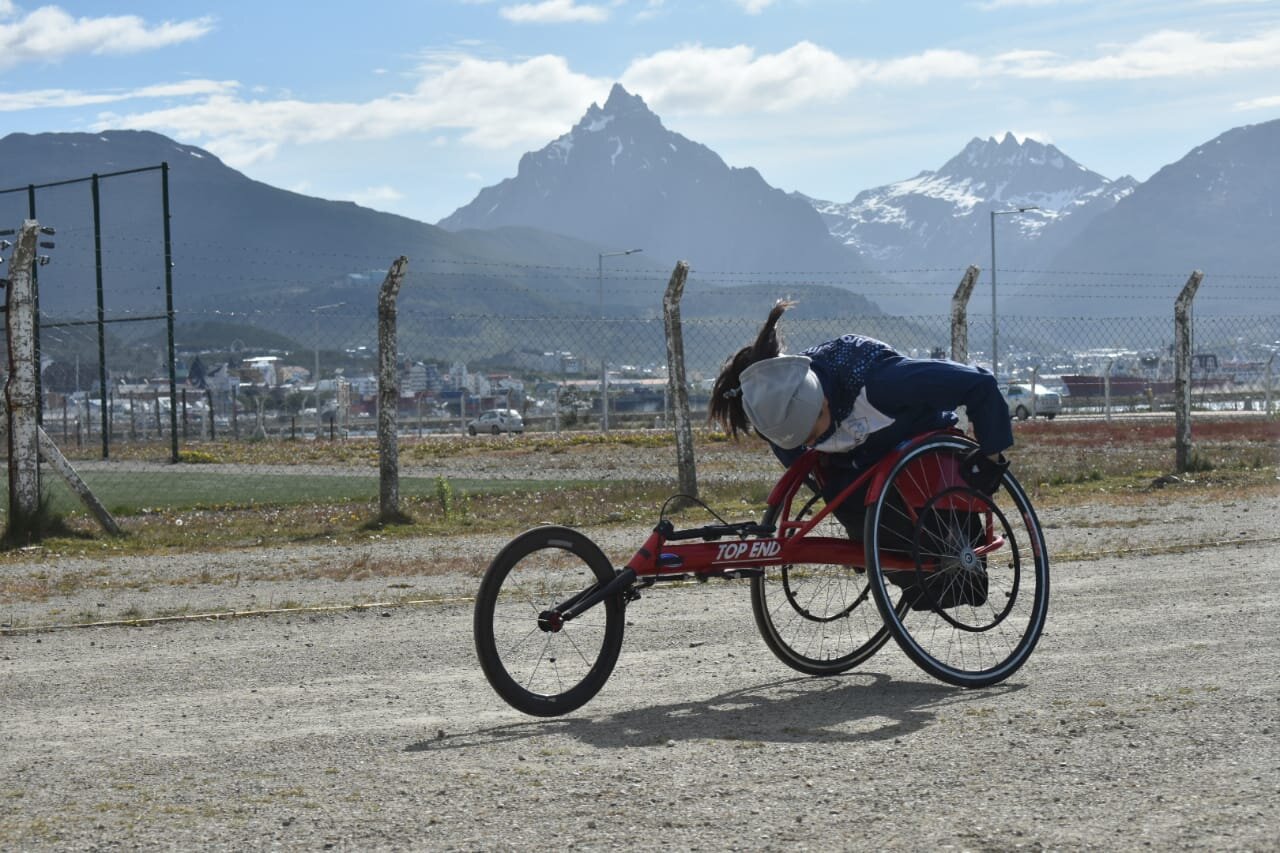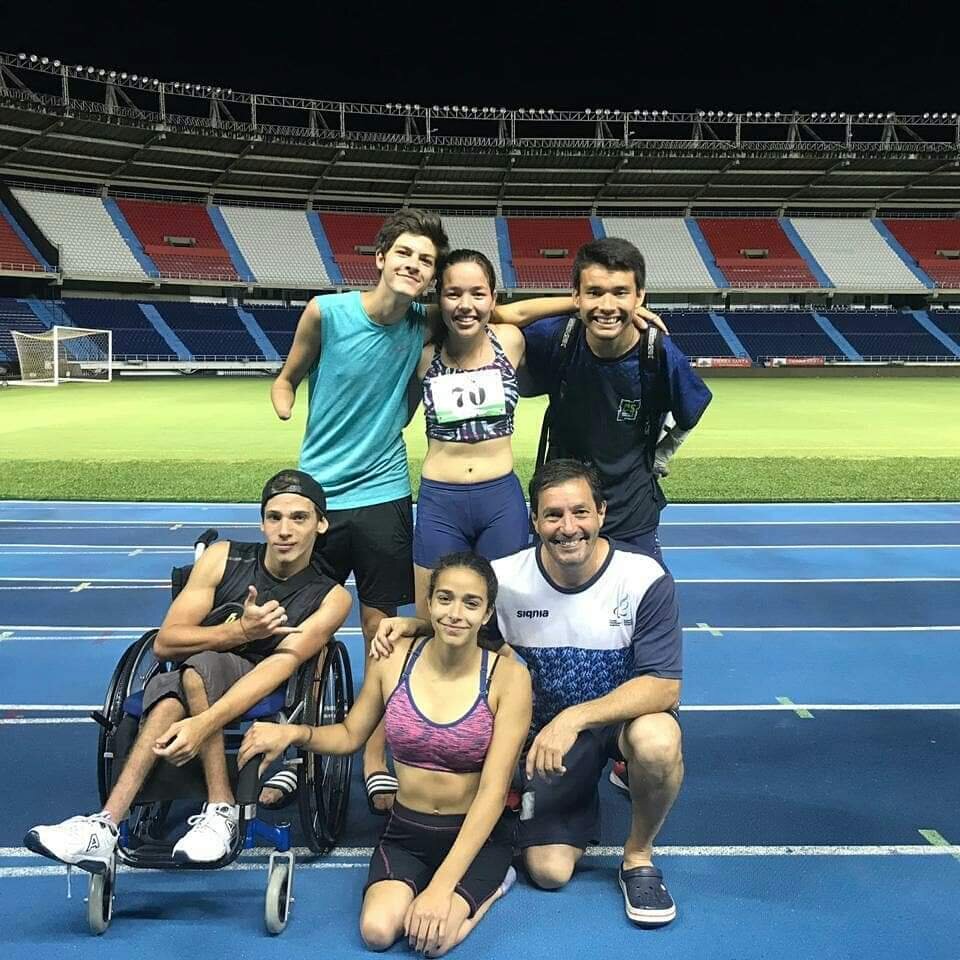When it comes to disability rights, wheelchair racer Lucía Montenegro won’t stay in her lane
(Courtesy of Lucía Montenegro)
The 17-year-old Argentinian uses her athleticism to advocate for change.
When wheelchair racer Lucía Montenegro competed in the 2017 World Para Athletics Junior Championships — her first world tournament — she was convinced she would come in last. She raced as fast as she could and when one competitor passed her, she was just waiting for the others to leave her in the dust. But they never did.
“I was running and wondering, ‘What's going on, why are they not passing me? How am I coming second? I must be counting wrong,’” she remembers.
(Courtesy of Lucía Montenegro)
Lucía had counted correctly. The Argentinian para-athlete won silver in the 100-metre race, making her the 11th fastest junior female wheelchair racer in the world. Having only competed in one international competition before now, she was in disbelief. She’d seen her teammates win tournaments around the world but never thought she would be capable of the same.
“That showed me that what I was doing wasn't a small thing,” Lucía shares. “It made me look at everything I had achieved so far and what I would be able to continue achieving.”
Born with a partial paralysis in her legs, Lucía is the only member of her family with a disability. “It was always normal in my house,” she says. “[My parents and siblings] never took it as a problem or as something where they said, ‘Since you won't be able to do anything…’ Because that's what doctors always say. ‘No, she's not going to be able to walk, she's not going to be able to bathe herself.’ No. My family said, ‘Try it and if you can, you can. And if you can't we'll find a way.’ Luckily it was always like that.”
While attending a summer camp for students with disabilities, Lucía discovered racing. She took to the sport quickly and in 2014, a coach suggested she try out for an upcoming national competition in Buenos Aires. “I said yes but the truth is, I had no idea about anything. I mean, I've never heard of Paralympic sports outside what we did, which was more recreational,” Luca says. “I had never heard about what was good about the Paralympic Games and that there were different categories and different sports.” She qualified for the race — and she’s been competing ever since.
The 19-year-old lives for the thrill of the sport. The 100-metre circuit is her favourite race because it’s where she can give it her all “with maximum force, with maximum speed.” To maintain her stamina, Lucía follows a rigorous schedule. She trains for at least two hours a day, Monday through Saturday, alternating between speed, strength and technical workouts. Even though the COVID-19 crisis disrupted her regular training, Lucía has still found a way to make things work (including using juice and oil bottles as weights). Since she can’t see her coach, she records her practice sessions for him, which he watches and sends back with corrections. It’s a lot of work, but Lucia doesn’t want to lose any of her momentum.
Off the racetrack, Lucía loves competing because of the friendships and connections she makes by meeting athletes from all over the world. “It's that cultural exchange of thoughts and opinions and tastes that caught my attention,” she explains. “I liked it because I met a lot of people and you exchange a lot about your cultures with each other and ways to see things that open up your mind a lot.”
But getting into those tournaments isn’t always easy — especially when you have to deal with sport governing bodies. Lucía almost missed two international tournaments last year because the Argentine Paralympic Committee didn’t grant her request for authorisation until the last moment. Sometimes they don’t share competition information with every athlete — many on Lucía’s team didn’t know about a tournament in Argentina that would’ve qualified them for the Tokyo 2020 Paralympic Games. Now, they might not be able to compete.
(Courtesy of Lucía Montenegro)
And living with a disability in Argentina means navigating another set of challenges. Things many non-disabled people take for granted, like using public transportation or being able to access all of your school facilities, Lucía has had to fight for. Her mom wanted her to attend the same school as her sister but the school refused to admit her.
“I was going to be the first student with a disability and the school wasn't adapted,” Lucía shares. “Although I didn't need it, the school didn't want me there because it wanted to avoid any problems I could have. They said, ‘We can't have a disabled person because we don't have adapted bathrooms. There are steps, there are stairs, etc.’ And I always lived at home with stairs. I never used ramps or a different bathroom so we explained that to the school, but the school still refused.”
It took multiple meetings with school officials until they finally accepted her. This victory turned out to have a major impact on the school’s enrolment policies. “After I got into school other people with disabilities came in. So that's a super positive thing, because if not, the school wouldn't have interacted with a disabled person. They wouldn't have learned,” Lucía reflects.
There’s a lot of work needed to improve life for people with disabilities in Argentina, but Lucía believes in the power of Paralympic movement to change perceptions: “[Sports are a] tool to show society that you shouldn't stay at home, locked up, without doing what you want to do and what you like and what you love.”
 Read more
Read more














